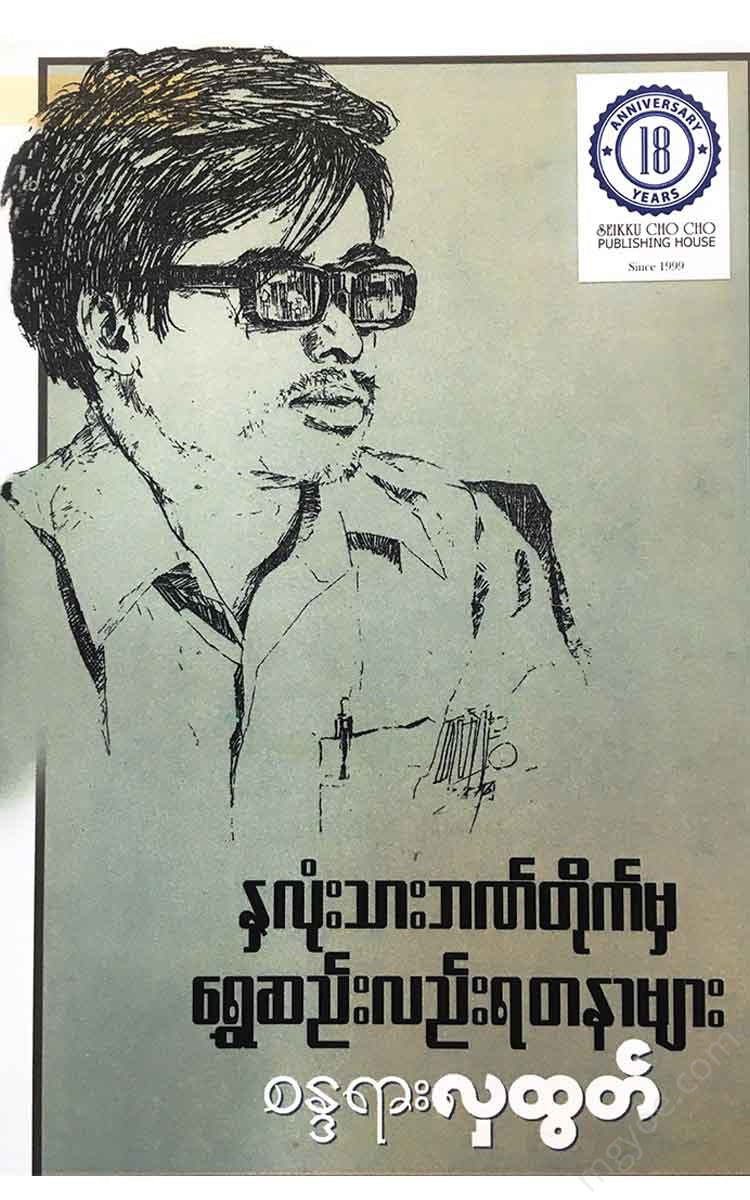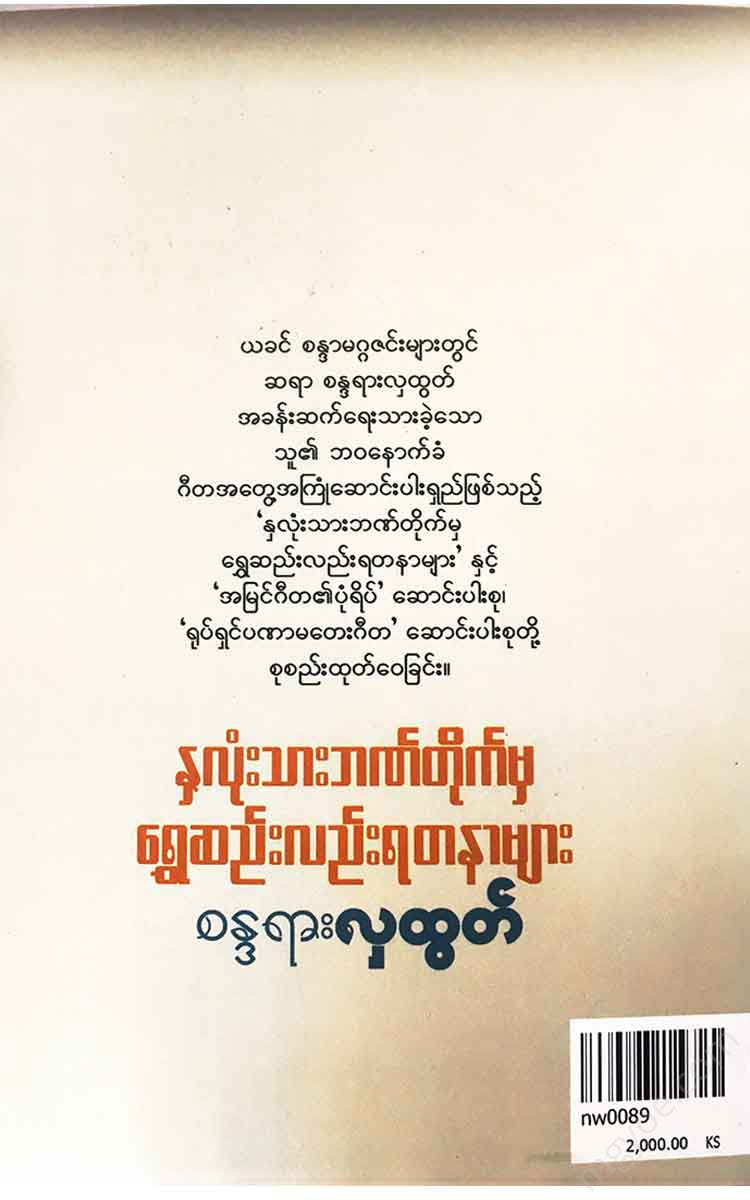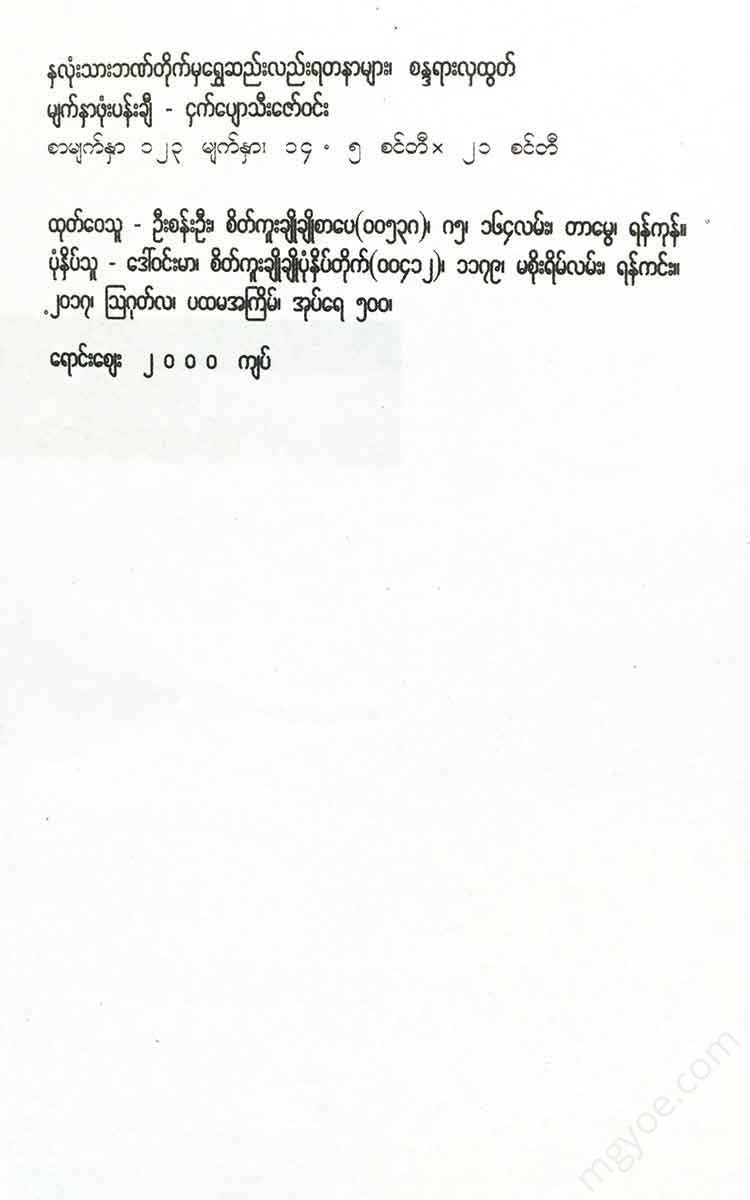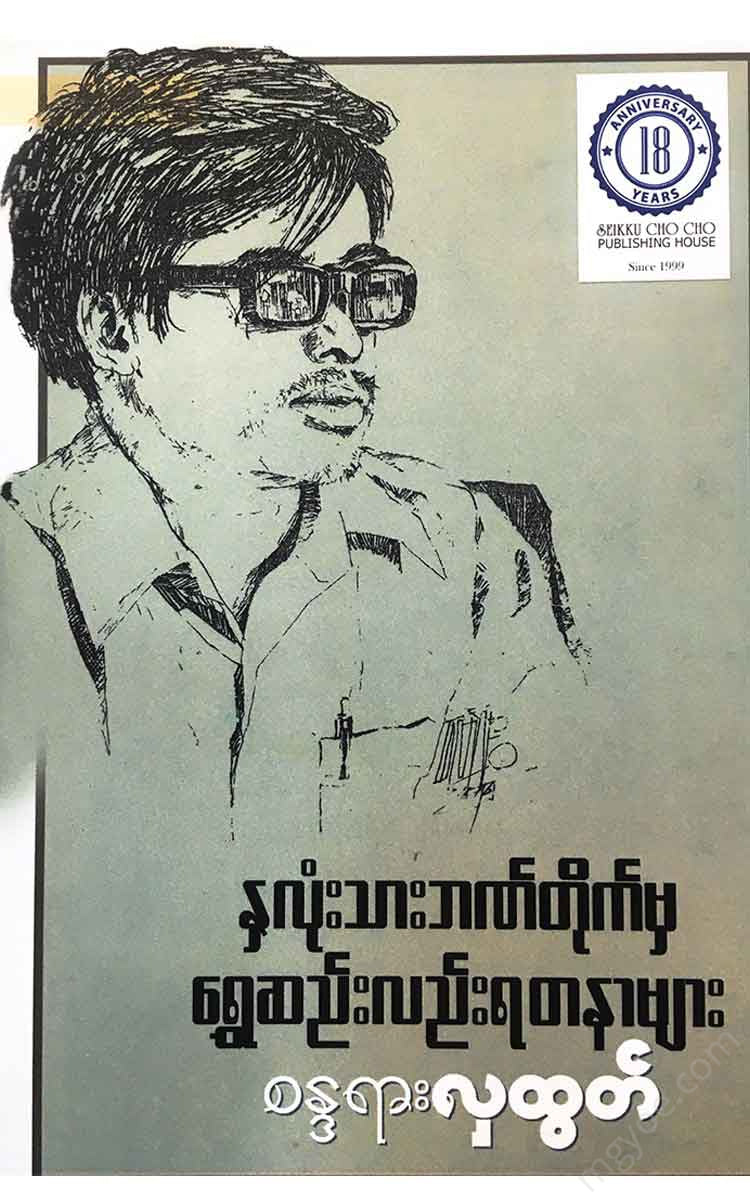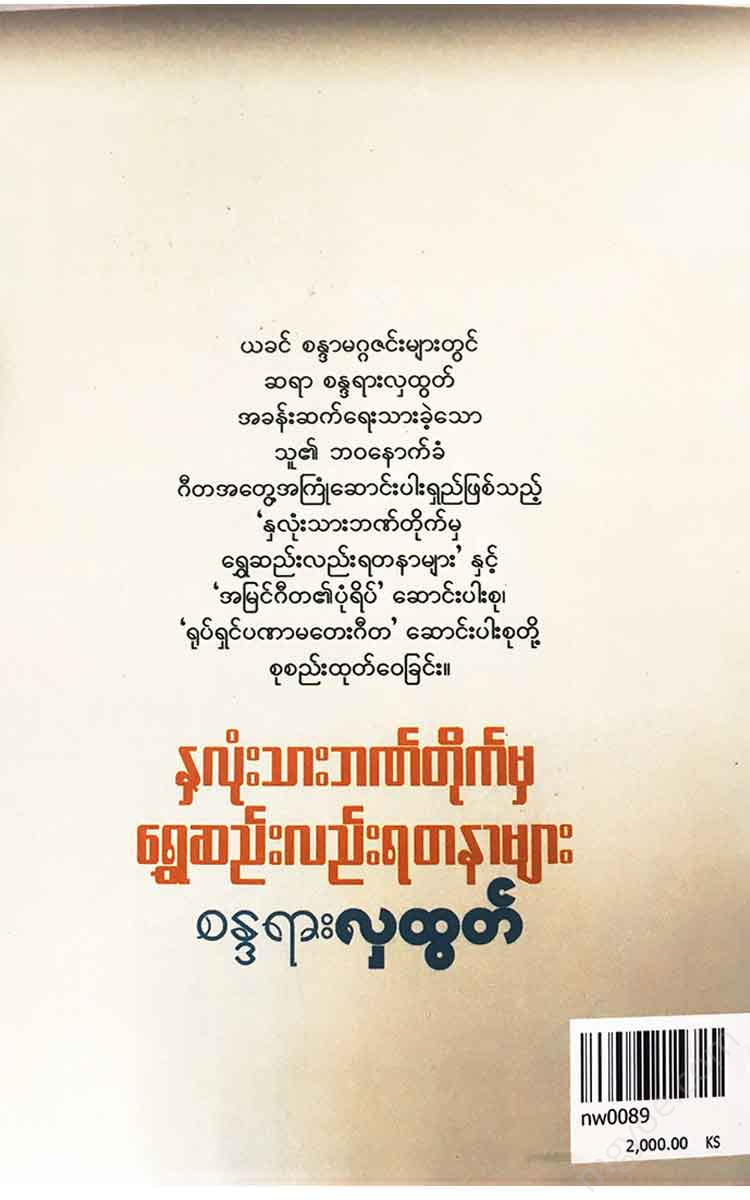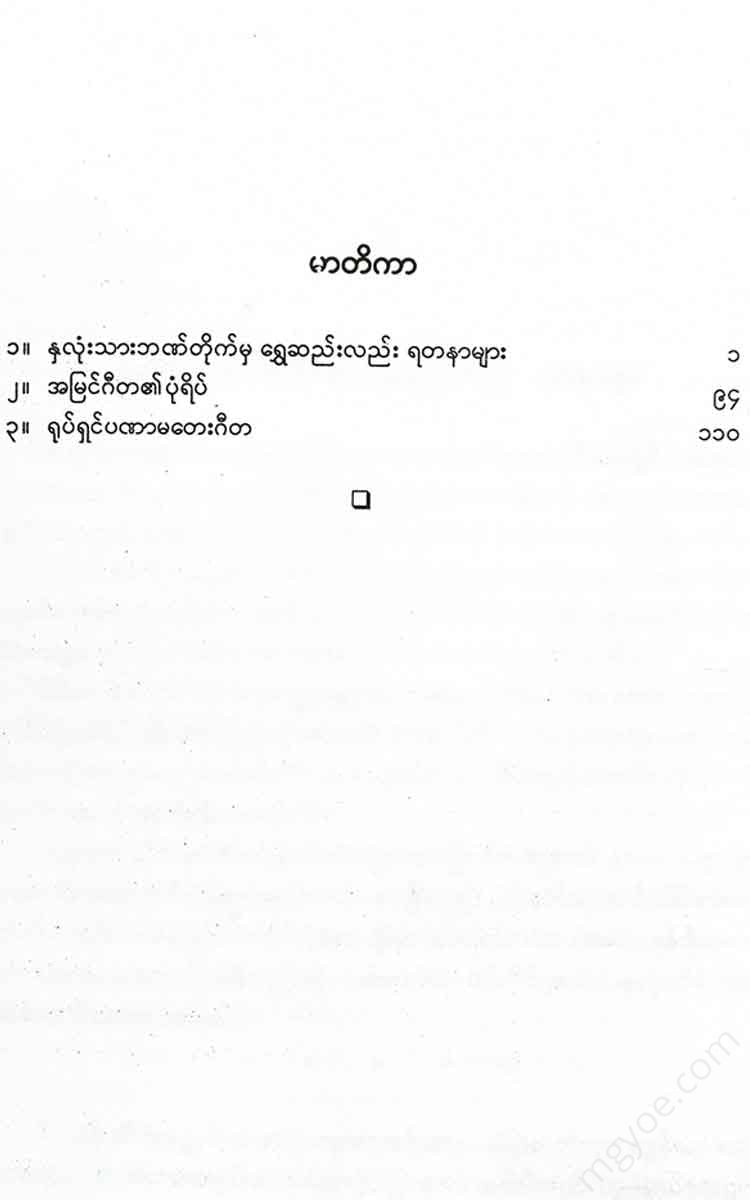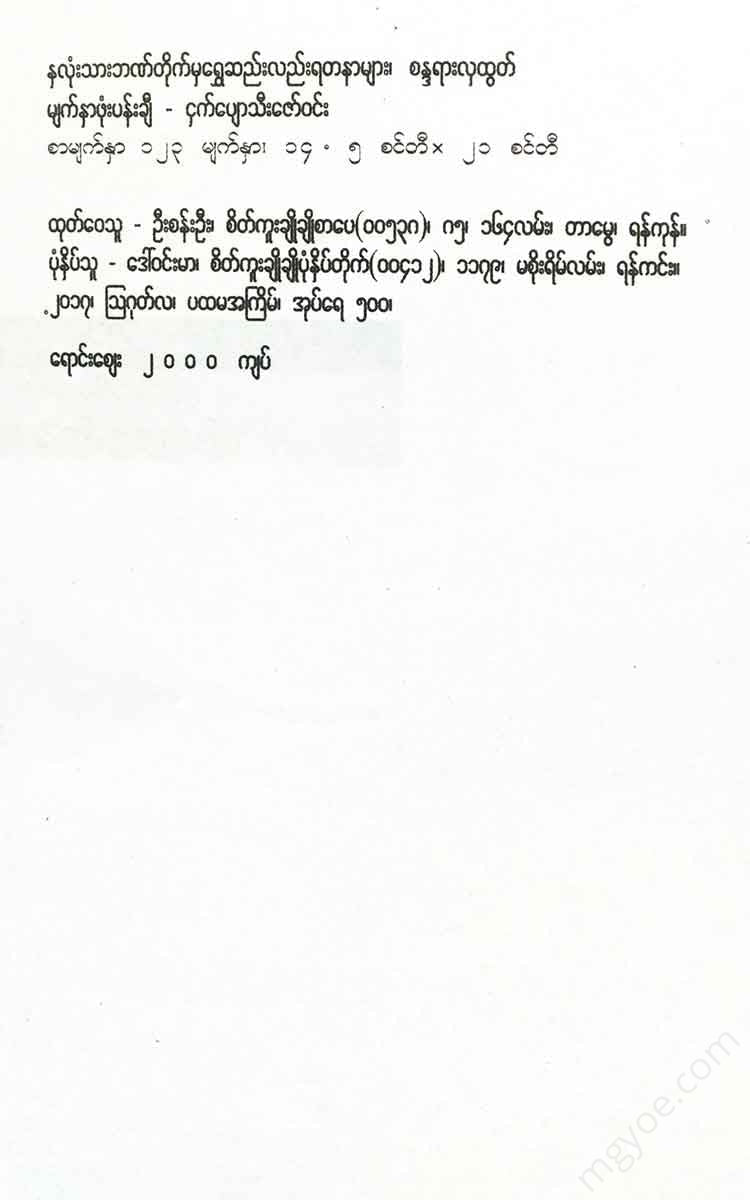စိတ်ကူးချိုချိုစာပေ
Sandara Hla Htut - Gold and silver treasures from the heart's bank
Sandara Hla Htut - Gold and silver treasures from the heart's bank
Couldn't load pickup availability
Gold and silver jewelry from the heart's bank
Some music enters the ear and leaves the ear, some music reaches the brain from the ear. Some music is sent out through the brain through the ear, some music is sent to the heart, and sometimes the heart stores it. Some music is not stored and is sent out through the ear. Similarly, there is music that does not enter the ear. Let's say it does not enter or is not received.
There is nothing like the joy of collecting precious objects that you love and taking them out from time to time. It is like storing precious treasures in a vault, never to be lost, ready to be used or worn when needed.
I have music that I have collected for years, from the time I first knew about music until today. Some of it is not something I have to keep in a specific place, but is hidden in a “secret place” like my heart. Most of it is so precious that I keep it in my heart to have it for the rest of my life.
I can't say for others what age they start to understand music. For me, I think it's around three years old. It's like people define the age at which they start to understand music in different ways. Just as everyone is different in their intelligence and talent, the way they develop, develop, and are born with a musical talent is also different from one person to another.
When I said that I knew music at the age of three, I can only conclude from my vague memory and the stories of my mother, brother, and sisters that I was already aware of music and interested in it at that age. That is why I said that I knew music. It does not mean that I already felt and liked music. Musical Sense and Musical Appreciation are very different.
In our house on the other side of Wa Khema, my father bought a piano, a lute, a violin, and a phonograph for his children. My father was not a musician. He was a hobbyist. My father was a licensed motorcycle mechanic named Myanmar Htoo, who built most of the small motorcycles that were being driven in the delta regions of Wa Khema, Myaung Mya, Pathein, Mawlamyine Island, and Ein Me. Before the war, the owner of Myanmar Htoo Motorcycle Shop, U San Htoo, was well-known. I was the youngest of seven children. My eldest sister, my eldest brother, and my second eldest sister all played the piano. Among them, my eldest brother was a teacher. His name was Thakin Sein Thwin. A teacher is someone who teaches the children everything they know about playing an instrument. He is not a professional musician. But he can play the flute. He also takes lessons from famous musicians in Wa Khema, such as U Thein Pe and U Ba Cho. He especially learned to play from records. Brothers and sisters numbered 1, 2, and 3 are passionate about music, and my older siblings, numbered 4, 5, and 6... they don't even come close to playing instruments. Finally, numbered 7, I... they say that it's a genetic trait.
When it comes to children, it is important to remember that they are the first to see something different from their parents. What they experience deeply influences their lives. These perceptions, hearings, and experiences shape their lives in one way or another. I have heard that at one point or another, their lives become intertwined.
When I was a child, I first heard a piece of music that I recognized. If I told you the name of this song... you would be surprised. Why? Because it was a Pan Myaing Le song. Yes. Pan Myaing Le sung by Ma Aye Mi on the record. But for me, it was Pan Myaing Le by Shwe Pyi Aye on the piano. Ma Aye Mi's singing didn't touch my tender heart. I didn't understand the lyrics at all. Only the sound of Sayar Shwe Pyi Aye's piano touched my heart and soul. It was familiar.
This is how it is... My older brother and sister would play the record and go to Pan Myaing. The record was two discs, and even if we had to listen to the whole song, it would take at least 12 minutes because there were four sides on each side. They would play the record every day. They would listen to it from beginning to end many times. They would memorize the notes and play them back on the piano. The song is long and they keep playing it like "Pan Myaing Le" and they can't move forward. So, if it's a verse... I hear it over and over again. After more than a month, the song ends. Pan Myaing Le has been repeated hundreds of times in my ears, and I don't want to hear it again and again... It's like it's been drilled into my ears, so can I bear it without getting used to it? Even if there is a talking parrot at home, I can recite it by heart. I also remember the verses and the sounds of them. Sometimes... When they are playing, I have to step in and support them with my mouth. I don't look good. I was shouted at, "Don't mess around, come in and try it." I was 4 years old at the time, in 1940.
When my older brothers and sisters were not around, I would turn on the piano and use one finger to search for the sounds of the song I had heard in my ears on the piano keys. I would try to play it. It wasn't bad. When I found it, I could. When I couldn't, I would search for it with great difficulty. When I stood up, the piano keys were right in front of my eyes, right next to my face. What could be closer than that?
You have probably seen it before. If you open the lid of a piano for a child, he will first touch it with his hands. Then, when he is too tired, he will pound the piano keys with both hands like wheat. Then, when he is impatient, he will play with his hands. Sometimes he will even make fists and support them with his elbows. I am not used to doing these things, but I am told that I play with one finger, one by one, searching for the sound. But when I come back from outside and see it... I get angry. "This... is not a child's toy, go and play on the beach." Actually, I don't want to play on the beach, I want to play on the piano. My father realized this and said, "Let me play, if I play slowly, the piano strings won't fall off," so I was allowed to "play" on the piano when my brothers and sisters were not around. That's how I started to play a little bit here and there. "Try it out." I can catch the sound of the winding parts of the Pan Myaing valley flowing in my ears, little by little.
One day, while I was playing Pan Myaing Le, my father was sitting in a reclining chair and listening intently. He said to his older brother, "This guy is not far behind... He must be." Then... he ordered me to start learning the piano. And so, because I played "Pan Myaing Le" so well, I started learning to play the piano.
In 1941, the Second World War fell on Burma, and the political situation changed for my older brother, who was about 15 years older than me. I had three songs, Gandhamataung, Againg Maung, Sein Kyung Nila, Chit Sya Ko.. etc. While I was on the “Kaung Chi Sangkha” tour, my older brother disappeared from home one day. He went with the monks to Myaung Mya, went to Rangoon, and went to war. At that time, the activities of the monks in the Delta were very active and in full swing.
When the country became unstable, schools closed. I didn’t even have to go to school. Before I knew anything about Kagyi Kakyu, I first got acquainted with the metal, the five-holed ropes, and the degrees. My brother was not there, and my second elder sister, Ma Mya Shin, taught me a little. Since the school was closed at that time, I remember that Ma Mya Shin’s friends and acquaintances would gather at her house and sing and play. Manu Nu, Ma Hla Yin, Ma Khin Su (Khin Hnin Yu), and Ko Hla, Ko Mya Maung (the late Deputy Minister of Information, U Mya Maung). Ko Hla played the piano well, was handsome, and had rich parents. She was in Myoma School in Yangon. She used to come to Ma Mya Shin and teach me the song “Nat Shin Naung” that she had learned from A Wan Khin Maung in Yangon.
I, who had been playing big songs all the time, was very practical and agile when I was a child. I had to play whatever the audience at home wanted to sing.
Those were my first year music experiences. There was no system in the places where I studied music, and there was no system in which I had to study after which song. They just gave me what I thought I should study. Now that I think about it, it was strange. My two teachers, Aung Kyi and Kya Hla, taught me practically. My two teachers, Shwe Pyi Aye and A Wan Khin Maung, showed me the pieces from the records. However, I had not yet met the real teacher who would change my life. That person was Har U Ba Than, who would become my adoptive father.
